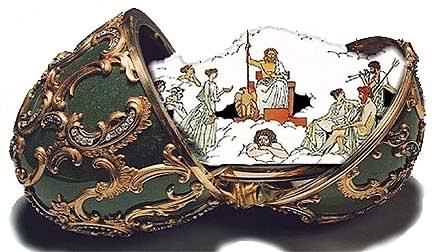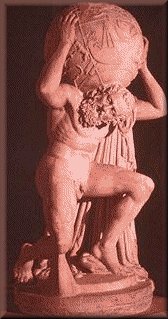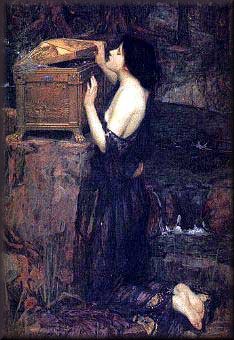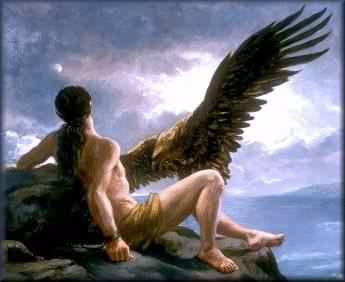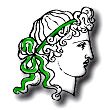In the beginning, there was formless confusion and Chaos brooded over the unbroken darkness. Then out of the void appeared Erebus, the unknowable place where death dwells, and Night (Nyx). All else was empty, silent, endless, darkness. Then somehow Love (Eros) was born bringing a start of order. From Love came Light and Day. Once there was Light and Day, Gaea, the Earth appeared. Gaea alone gave birth to Uranus (Heaven, Sky), the god of the heavens. Uranus became Gaea's mate and Heaven and Earth joined. Together they produced the three Cyclopes, the three Hecatoncheires (100-Handed Ones), and twelve Titans. But Uranus was a bad father and husband. He hated the Hecatoncheires. He imprisoned them by pushing them into the hidden places of the earth, Gaea's womb. This angered Gaea and she plotted against Uranus. She made a flint sickle and tried to get her children to attack Uranus. All were too afraid except the youngest Titan, Cronus. Gaea and Cronus set up an ambush of Uranus as he lay with Gaea at night. Cronus grabbed his father and castrated him with the stone sickle, throwing the severed genitals into the ocean. The fate of Uranus is not clear. He either died, withdrew from the earth, or exiled himself to Italy. As he departed, he promised that Cronus and the Titans would be punished. From his spilt blood came the Giants, the Ash Tree Nymphs, and the Erinyes. From the sea foam where his genitals fell arose the beautiful Aphrodite. Cronus became the next ruler. He imprisoned the Cyclopes and the Hecatoncheires in Tartarus. He married his sister Rhea, and under his rule the Titans had many offspring. He ruled for many ages. However, Gaea and Uranus both had prophesied that he would be overthrown by a son. To avoid this Cronus swallowed each of his children as they were born. Rhea was angry at the treatment of the children and plotted against Cronus. When it came time to give birth to her sixth child, Rhea tricked Cronus. She secretly carried the child to Crete and then wrapped a stone in baby blankets. Cronus, thinking it was a baby, ate the stone and thought himself safe. The child was Zeus. He grew into a handsome youth on Crete, raised by the divine goat Amaltheia and the nymphs called Curetes. Zeus consulted Metis on how to defeat Cronus. She prepared a drink for Cronus which would force him to vomit up the five other children. Rhea convinced Cronus to accept his son and Zeus was allowed to return to Mount Olympus as Cronus's cupbearer. This gave Zeus the opportunity to slip Cronus the specially prepared drink. This worked as planned and the other five children were vomited up. Being gods they were unharmed. They were thankful to Zeus and made him their leader. Cronus was yet to be defeated. He and the Titans, except Prometheus, Epimetheus, and Oceanus, fought to retain their power. Atlas became their leader in battle and it looked for some time as though they would win and put the young gods down. However, Zeus had other plans. He went down to Tartarus and freed the Cyclopes and the Hecatoncheires. Prometheus joined Zeus as well. He returned to battle with his new allies. The Cyclopes provided Zeus with lighting bolts for weapons. The Hecatoncheires he set in ambush armed with boulders. When the time was right, Zeus retreated, drawing the Titans into the Hecatoncheires' ambush. The 100-Handed Hecatoncheires rained down thousands of boulders with such a fury the Titans thought the mountains were falling on them. They broke rank and ran away, giving Zeus victory. Zeus exiled the Titans who had fought against him into Tartarus. All except for Atlas, who was singled out for the special punishment of holding the world on his shoulders.
However, even after this victory Zeus was not safe. Gaea, angry that her children had been imprisoned, gave birth to a last offspring, Typhoeus (Typhon). Typhon was a creature more terrible than any that had gone before. When the gods saw Typhon and his wife Echidna coming, in terror they changed into animals and ran off to Egypt. Brave Athena ridiculed Zeus into action, and eventually he regained his courage and a terrible battle raged, which left hardly a living creature on earth. Zeus was fated to win however. As Typhon tore up huge Mount Aetna to hurl, Zeus, using the thunder and lightning given him by the Cyclopes, unleashed one hundred well-aimed lightning bolts at the mountain and fell back, pinning Typhon underneath. Typhon was buried under Mount Etna in Sicily and there he lies to this day, belching fire, lava and smoke through the top of the mountain. Much later a final challenge to Zeus' rule was made by the Giants. They went so far as to attempt to invade Mount Olympus, piling mountain upon mountain in an effort to reach the top. But the gods had grown strong and with the help of Hercules, the Giants were subdued or killed. Having been cleared of all the monsters, the world now was ready for mankind. The Titans Prometheus and Epimetheus were spared imprisonment in Tartarus because they did not fight with their fellow Titans during the war with the Olympians. They were given the task of creating man. Epimetheus was in charge of the task of giving the animals and creatures of the earth their various qualities, such as swiftness, cunning, strength, fur, wings. Unfortunately, by the time he got to man Epimetheus had given all the good qualities out and there were none left for man. So he turned to Prometheus for help. Prometheus took over the task of creation and sought a way to make man superior. He made man stand upright like the the gods did and gave them fire. Prometheus loved man more than he did the Olympians, who had banished most of his family to Tartarus. When Zeus decreed that man must present a portion of each animal they sacrificed to the gods, Prometheus decided to trick Zeus. He created two piles, one with bones wrapped in juicy fat, the other with the good meat hidden in the hide. He then made Zeus pick one pile, and that would be his future offering. Zeus picked the bones. Since he had given his word, Zeus had to accept that as his share for future sacrifices. In his anger over the trick, he took fire away from man. However, Prometheus defied Zeus - He saw man freezing and unable to cook without fire and took pity. He lit a torch from the sun and secretly brought it back again to man. When he found out, Zeus was enraged that man again had fire. He decided to inflict a terrible punishment on both man and Prometheus. To punish man, Zeus had Hephaestus create a mortal of stunning beauty. The gods gave the mortal many gifts of wealth. This creation was Pandora, the first woman. A final gift was a box which Pandora was forbidden to open. When Hephaestus had completed his creation of Pandora, Zeus sent her to Epimetheus as a present. Prometheus had warned his brother Epimetheus not to accept gifts from Zeus but Pandora's beauty was too great and he allowed her to stay. Daily, Pandora's curiosity grew as to the contents of the box. Knowing that she wasn't allowed to open it tormented her. Finally succumbing to her curiosity, she opened the jar and out flew plagues, misery, mischief and just about every sorrow known to mankind.
However, the bottom of the jar held one good thing - Hope. It was the only good thing in the jar and remains to this day mankind's sole comfort in times of misfortune. A greater punishment lay in store for Prometheus. Zeus had his servants, Force and Violence, seize Prometheus, take him to the mountain Caucasus, and chain him to a rock with unbreakable adamanite chains. Here he was tormented every day by an eagle sent by Zeus that would feast on his liver, which would grow back overnight, only to be eaten again the next day. Zeus gave Prometheus two ways out of this torment. He could tell Zeus who the mother of the child that would dethrone him was. Or meet two conditions: First, that an immortal must volunteer to die for Prometheus. Second, that a mortal must kill the eagle and unchain him. Eventually, Chiron the Centaur agreed to die for him and Hercules killed the eagle and unbound him.
Prometheus' name has stood through the centuries, from Greek days to our own, as the great rebel against injustice and authority of power. He was brave enough to stand up to mighty Zeus and ensured the survival of humans.
The creation of men had five transformations. The ancient writer Hesiod recounts the ages of men: the Golden Age, the Silver Age, the Age of Bronze, the Age of Heroes and finally, the time of Hesiod, the Age of Iron The Golden Age The Golden Age of mortal people was, as you might expect, wonderful. They extended friendship to all mortals and respect to all immortals. They lived without disease or hardship. When it came time for them to die, they laid down to sleep and awoke as a blessed spirit, roaming the earth and doing good deeds for all the righteous souls they meet. The Silver Age The Silver Age was not as good as it may sound, in fact, it was quite inferior to the previous golden generation. This generation of mortals stayed as children for one hundred years and then, reaching their adulthood, were disdainful of their creator, Cronus, and incurred his wrath. They too, were destroyed. After death, they were transformed into blessed spirits. They are secondary and underground but still deserving of worship. The Age of Bronze The Bronze Age mortals were made from the ash spear. They were men of warcraft and violence. They finally extinguished themselves and Hesiod does not say if they were turned into spirits. The Age of Heroes The Age of Heroes, the fourth age, was the period prior to, and including, the Trojan War. It was the Age of Blood and Glory. The sons and daughters of the immortals populated the earth alongside the mere mortals. These lesser creations of Zeus, mortal men, were the pawns of the Heroes and the toys of the immortals. Zeus established a godly domain for the spirits for the deceased heroes at the end of the world. Zeus also released his father, Cronus, from Tartarus to join the heroes in their paradise. The Age of Iron The Age of Iron was the age of Hessiod (800 B.C.E.) and perhaps also the age we live in now. If that is true, by the will of Zeus, we are doomed to hardship and, finally, pitiless destruction. There's supposedly absolutely nothing we can do about it, resistance is futile. It's quite a pessimistic view of humankind.
|
